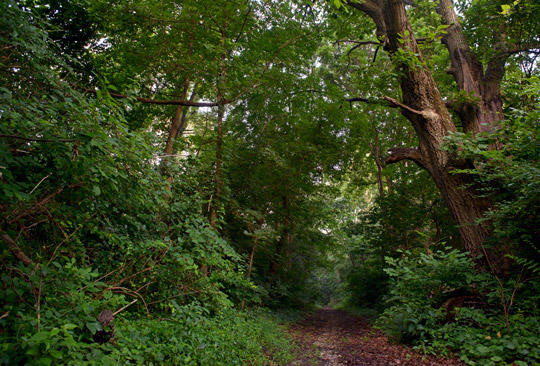 Haddington Woods is the first place students of a free land management class will test what they’ve learned. | Photo by Jen BrittonFree land management course teaches citizens
Haddington Woods is the first place students of a free land management class will test what they’ve learned. | Photo by Jen BrittonFree land management course teaches citizens
to take care of their forests
Twenty-five Philadelphians gathered this past June to learn how to manage their forest. But many of those who met at the Haverford Avenue branch of the Free Library in West Philadelphia had no technical background in restoration, ecology or anything else you’d expect for land managers.
The “Short Course in Land Management,” taught by David Hewitt, research coordinator for the Wagner Free Institute, was a “highly distilled version of an ecology course I teach to city planners at Penn,” Hewitt says. The free, six-week course is part of an innovative experiment to engage local residents in managing the city’s forests, meadows and waterways, and is open to anyone. The laboratory is Haddington Woods.
Right now, the Haddington Woods (also known as the “Bocce Woods” for the bocce ball courts there) along Cobbs Creek don’t look all that special, but that’s the point. You’ll find deciduous woods and a rocky creek, just like in all of Philadelphia’s other creek corridor parks. You might notice some invasive plants, like Japanese knotweed along the creek, and you’re likely to spot deer walking around whenever you visit, an indication that there are too many of them, just like in many other patches of Penn’s woods. In other words, it’s the perfect place to try forest management experiments to see how they’ll work throughout the city.
Once upon a time—maybe 80 years ago—Philadelphia’s forests didn’t have too many deer, hadn’t been torn up by eroding stormwater, hadn’t lost the battle to invading exotic plants like Japanese knotweed and porcelain berry, and boasted a full complement of trails and facilities to welcome visitors.
The last master plan for then-Fairmount Park, published in 1999, emphasized restoration of vegetation and streams, and the city has had some success, repairing stormwater damage, shrinking the deer herd, fighting back some invasive exotics, restoring meadows and replanting native forests. Unfortunately, Philadelphia cannot afford to turn its parkland forests back to their early 20th century state, according to Joan Blaustein, director of Philadelphia Parks and Recreation’s Urban Forestry and Ecosystem Management Division.
“We have to be prepared to do adaptive management, doing restoration work, monitoring results and adjusting as we go,” Blaustein says. “How do you monitor them to see if the different approaches are working? Citizens. How do we engage citizens in way that will be meaningful to them and include them in the monitoring?”
Having educated citizens take part in the next stage of park management fills a gap for a cash-strapped city, but also helps build engagement.
“I want to be in on the planning. It gives me something to leave behind,” says Vaughn Goldsmith, a West Philadelphia resident and “Short Course in Land Management” student.
Goldsmith and his fellow students will help monitor the results as Parks and Recreation embarks on experiments including deer fencing and invasive species clearing.
“I had not been to this section of the park before this spring. Now, I plan to return there to enjoy the beauty that is already there, as well as to see things as they change and hopefully get involved in monitoring some of the changes,” says Mandy Katz, an East Parkside gardener, musician and artist.
The second Haddington Woods course on experimental design will start in the fall, and Parks and Recreation also plans similar citizen engagement projects for sections of the Wissahickon and Pennypack.
“The parks in Philly are actually some of our greatest natural, historic and cultural treasures,” Katz says. “The more we all know about how to care for them, the better we can make them.”
Bernard Brown is an amateur field herper and bureaucrat. He writes about urban natural history and sustainable eating.


